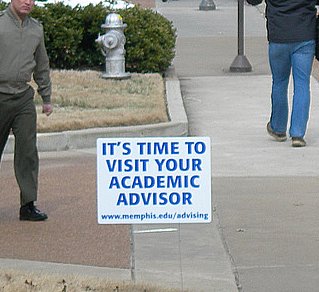It’s a good idea for all college students to visit their advisors, and business majors are particularly lucky on that front. Most business schools have academic and career advising that caters specifically to them. However, it’s easy for students to get by, figuring out their own schedules, Googling answers to their career questions, and ultimately never visiting their advisors ever – except to do the occasional degree check.
This doesn’t mean that professional advising can’t help them, of course. Students who don’t think they have anything to ask may be unaware of resources and opportunities the school can offer, and might be needlessly worrying about an overcrowded academic schedule.
Below, two academic advisors from top business schools discuss the most common questions they receive, the questions they think business students should be asking, and advice for exploring different areas of business without falling behind on the essentials.
ALISON LEVEY, ACADEMIC ADVISOR AT THE MENDOZA SCHOOL OF BUSINESS
Ask About Resources
According to Alison Levey, an academic advisor at the University of Notre Dame Mendoza School of Business, students should start the year off by asking their advisors about resources.
“We function as everything from signatures on forms to full-on life coaches, depending on the student’s comfort,” she says. “What students should be asking us is what resources are available to them. Often, most of their ideas of what they should major in come from what they hear from other students, and most of the time, they haven’t done any self-assessment or career research.”
Freshmen Should Join Clubs
“The general rule is that we don’t talk to freshmen until April,” Levey adds. “They have general counseling instead, which is less involved than what we do, so they can explore other things for a year.”
Instead of rushing to talk to business major advisors, Levey suggested that freshmen get involved in business clubs and network with older students, asking questions about the different majors and about internships.
“They can also attend on-campus info-sessions when companies come to visit, and they can get an idea of what working in business is like from those,” she says.
Sophomores Should Explore Majors
At Notre Dame, Mendoza students start taking business classes as sophomores, so sophomores typically make up the bulk of advising appointments.
“Most of their questions are about what they should major in, and though many of them learn a lot about themselves as they figure that out, we do try to make it easier,” Levey says.
There is a fair amount of movement between majors, usually after students have taken classes in their chosen majors and realize they don’t like them as much as they thought they would. “There are both extremes – the ones who have no idea what they want to do, and then figure it out, and the ones who are absolutely sure, who then change their minds.”
According to Levey, most of these changes happen during sophomore year, since it’s difficult to finish college in four years if a student switches after that.














Questions about this article? Email us or leave a comment below.